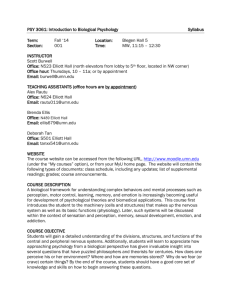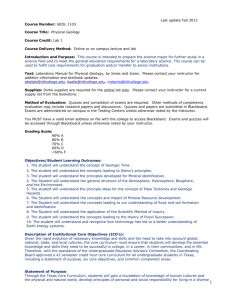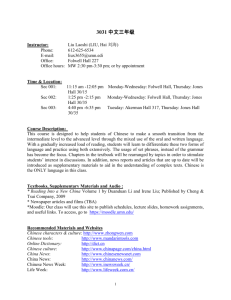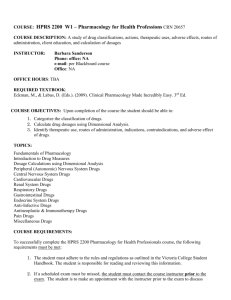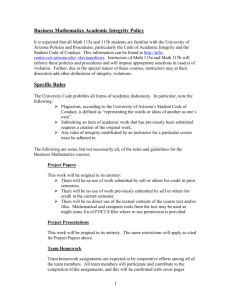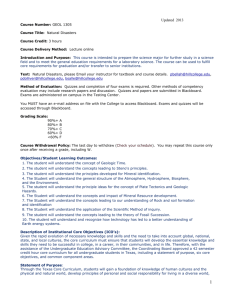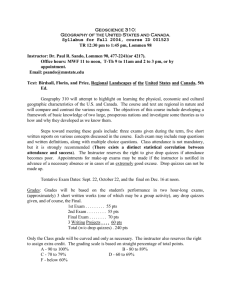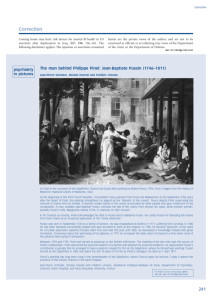PSY 3061: Introduction to Biological Psychology Syllabus Term
advertisement
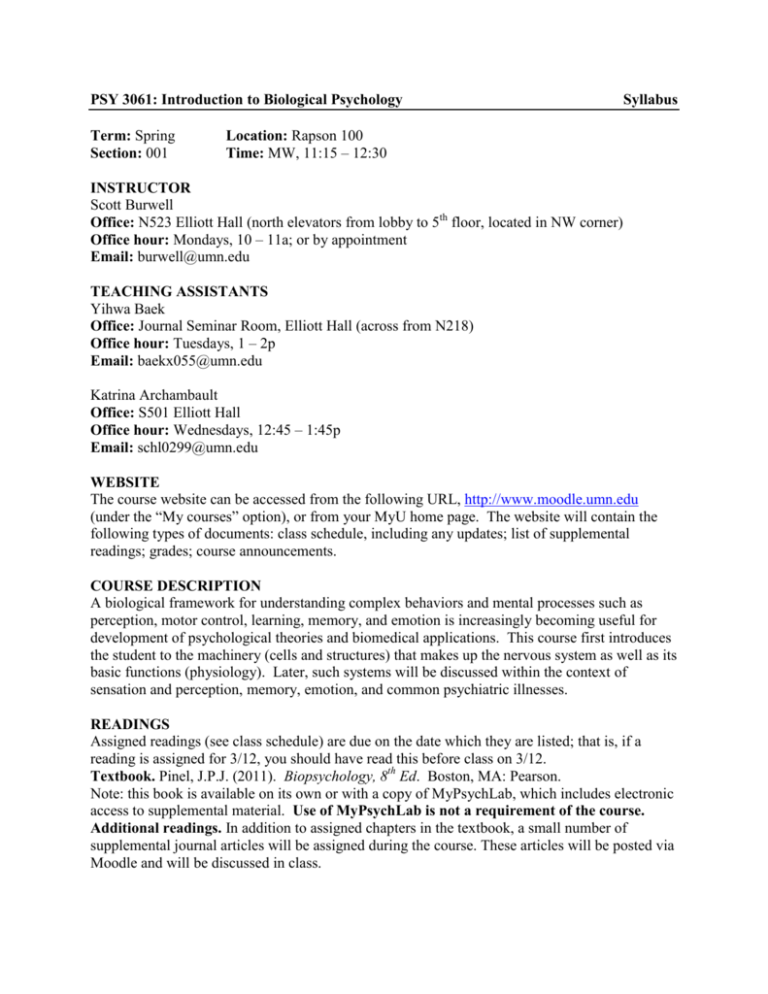
PSY 3061: Introduction to Biological Psychology Term: Spring Section: 001 Syllabus Location: Rapson 100 Time: MW, 11:15 – 12:30 INSTRUCTOR Scott Burwell Office: N523 Elliott Hall (north elevators from lobby to 5th floor, located in NW corner) Office hour: Mondays, 10 – 11a; or by appointment Email: burwell@umn.edu TEACHING ASSISTANTS Yihwa Baek Office: Journal Seminar Room, Elliott Hall (across from N218) Office hour: Tuesdays, 1 – 2p Email: baekx055@umn.edu Katrina Archambault Office: S501 Elliott Hall Office hour: Wednesdays, 12:45 – 1:45p Email: schl0299@umn.edu WEBSITE The course website can be accessed from the following URL, http://www.moodle.umn.edu (under the “My courses” option), or from your MyU home page. The website will contain the following types of documents: class schedule, including any updates; list of supplemental readings; grades; course announcements. COURSE DESCRIPTION A biological framework for understanding complex behaviors and mental processes such as perception, motor control, learning, memory, and emotion is increasingly becoming useful for development of psychological theories and biomedical applications. This course first introduces the student to the machinery (cells and structures) that makes up the nervous system as well as its basic functions (physiology). Later, such systems will be discussed within the context of sensation and perception, memory, emotion, and common psychiatric illnesses. READINGS Assigned readings (see class schedule) are due on the date which they are listed; that is, if a reading is assigned for 3/12, you should have read this before class on 3/12. Textbook. Pinel, J.P.J. (2011). Biopsychology, 8th Ed. Boston, MA: Pearson. Note: this book is available on its own or with a copy of MyPsychLab, which includes electronic access to supplemental material. Use of MyPsychLab is not a requirement of the course. Additional readings. In addition to assigned chapters in the textbook, a small number of supplemental journal articles will be assigned during the course. These articles will be posted via Moodle and will be discussed in class. SCHEDULE OF LECTURE TOPICS A provisional course schedule is included in this handout. Any changes to this schedule will be posted in the course website. It is your responsibility to check the website regularly for any changes to the course schedule. LECTURE STYLE Classes are lecture-based, combined with small group discussions and activities. Although some lecture content will draw from examples in the assigned textbook, much will come from primary research articles and other resources; therefore, student participation is strongly encouraged, and fully expected, throughout the course. RECOMMENDATION TO THE STUDENT Much of the material covered in this course will require the student to memorize structures and functions of the nervous system. This kind of content is often new to the typical undergraduate and not readily learned after only one or two exposures. In addition to keeping up with assigned readings and lectures, I strongly urge you to make and use flashcards throughout the semester. EXAMS There will be 4 exams. Exams will consist of multiple-choice questions that draw from material covered in class and in readings. Exam questions are designed to test your understanding of basic terminology and concepts, and your ability to apply these concepts. Exam grades will be posted on the Moodle website. Exams must be taken at the designated time. Students with disabilities and others who may require special scheduling should contact the instructor or TA by the end of the first week of classes to make any necessary arrangements. Prior semesters’ exams will not be available as study material and you will not be allowed to keep your exam after it has been graded. You will, however, be able to attend the instructor’s or TAs’ office hours to ask test preparation questions or would like to view an already-graded exam of yours. If coming to office hours to see an already-graded exam, please email us in advance so that we can be sure to have your exam on hand. MAKE-UP EXAMS Make-up exams will be given after the exam date only under a limited number of circumstances (see CLA policy for detailed policy). If you have a FORESEEABLE ABSENCE: in order to make up an exam you must obtain permission from the instructor at least 48 hours before the scheduled exam. If you have an UNFORESEEABLE ABSENCE, you must notify the instructor no later than 48 hours after the absence occurred. Before making up an exam, you must also provide written documentation corroborating your reason for missing the exam (e.g. physician’s note written on official stationary with a phone number, the documented death of a family member, etc.). Absences due to weather/commute difficulties are unacceptable. Questions on how an exam was graded should be submitted by email. It should be noted that once the grading is reevaluated, scores can move in a downward, as well as an upward direction! EXTRA-CREDIT POP QUIZZES Throughout the semester, several brief unannounced quizzes will take place in various formats (e.g., multiple choice, fill in the blank) during the lecture period. Students may work in small groups (up to 4 people) for quizzes. Quizzes often tap the student’s knowledge on subject matter for the current lecture-day and usually contain information relevant for the next exam. Each quiz is worth 2-points and counts towards extra-credit; a maximum of 20 quiz points will be available for the whole semester (a possible 10% of the course total!). Because quizzes often involve group-work and are in extra-credit (i.e. missing a quiz will not count-against your total marks, per se), under no circumstances will make-ups be allowed for quizzes. A typical semester consists of more than ten quizzes, so in the event that a student accrues more than 20 points, his or her best ten quizzes will go towards the final grade. Students are required to bring a supply of blank index cards with them to class. GRADING Final grades will be based entirely on the 4 exams and extra-credit quizzes. The final grades will be determined as follows: Exam 1 = 50 pts Exam 2 = 50 pts Exam 3 = 50 pts Exam 4 = 50 pts _________________________ Max. allowed = 200 pts Extra credit = 20 pts Approximate grading cutoffs from past semesters (NO guarantee these will be used THIS semester): A - 185 B - 160 C - 140 USE OF PERSONAL ELECTRONIC DEVICES: Using personal electronic devices in the classroom setting can hinder instruction and learning, not only for the student using the device but also for other students in the class. Cellular phones should be turned-off (vibrating phones are still a distraction!) during lectures. Laptops will be allowed for students to take electronic notes during lectures. However, if a given student demonstrates that he or she is using his or her laptop for business not directly relevant to lecture content, that student will lose laptop privileges. Under no circumstances are personal electronic devices allowed during exams. For complete information, please see: http://policy.umn.edu/Policies/Education/Education/STUDENTRESP.html. STUDENT CONDUCT CODE The University seeks an environment that promotes academic achievement and integrity, that is protective of free inquiry, and that serves the educational mission of the University. Similarly, the University seeks a community that is free from violence, threats, and intimidation; that is respectful of the rights, opportunities, and welfare of students, faculty, staff, and guests of the University; and that does not threaten the physical or mental health or safety of members of the University community. As a student at the University you are expected adhere to Board of Regents Policy: Student Conduct Code. To review the Student Conduct Code, please see:http://regents.umn.edu/sites/default/files/policies/Student_Conduct_Code.pdf. Note that the conduct code specifically addresses disruptive classroom conduct, which means "engaging in behavior that substantially or repeatedly interrupts either the instructor's ability to teach or student learning. The classroom extends to any setting where a student is engaged in work toward academic credit or satisfaction of program-based requirements or related activities." SCHOLASTIC DISHONESTY You are expected to do your own academic work and cite sources as necessary. Failing to do so is scholastic dishonesty. Scholastic dishonesty means plagiarizing; cheating on assignments or examinations; engaging in unauthorized collaboration on academic work; taking, acquiring, or using test materials without faculty permission; submitting false or incomplete records of academic achievement; acting alone or in cooperation with another to falsify records or to obtain dishonestly grades, honors, awards, or professional endorsement; altering, forging, or misusing a University academic record; or fabricating or falsifying data, research procedures, or data analysis. (Student Conduct Code:http://regents.umn.edu/sites/default/files/policies/Student_Conduct_Code.pdf) If it is determined that a student has cheated, he or she may be given an "F" or an "N" for the course, and may face additional sanctions from the University. For additional information, please see:http://policy.umn.edu/Policies/Education/Education/INSTRUCTORRESP.html. The Office for Student Conduct and Academic Integrity has compiled a useful list of Frequently Asked Questions pertaining to scholastic dishonesty:http://www1.umn.edu/oscai/integrity/student/index.html. If you have additional questions, please clarify with your instructor for the course. Your instructor can respond to your specific questions regarding what would constitute scholastic dishonesty in the context of a particular class-e.g., whether collaboration on assignments is permitted, requirements and methods for citing sources, if electronic aids are permitted or prohibited during an exam. SEXUAL HARASSMENT "Sexual harassment" means unwelcome sexual advances, requests for sexual favors, and/or other verbal or physical conduct of a sexual nature. Such conduct has the purpose or effect of unreasonably interfering with an individual's work or academic performance or creating an intimidating, hostile, or offensive working or academic environment in any University activity or program. Such behavior is not acceptable in the University setting. For additional information, please consult Board of Regents Policy: http://regents.umn.edu/sites/default/files/policies/SexHarassment.pdf PSY 3061: Introduction to Biological Psychology DATE 1/22 1/27 1/29 2/3 2/5 2/10 2/12 2/17 2/19 2/24 2/26 3/3 3/5 3/10 3/12 3/17 3/19 3/24 3/26 3/31 4/2 4/7 4/9 4/14 4/16 4/21 4/23 4/28 4/30 5/5 5/7 5/16 TOPIC Introduction: syllabus overview Introduction: course overview Evolution, inheritance, & gene expression Anatomy of the nervous system Neurophysiology I – neural conduction Neurophysiology II – synaptic transmission Experimental design EXAM I Research methods I Research methods II Sensation & perception I Sensation & perception II Sensorimotor systems Sensorimotor systems EXAM II No class, enjoy your SPRING BREAK! Neurodevelopment Brain damage & neuroplasticity Learning & memory I Learning & memory II Eating behavior Hormones & sex EXAM III Sleep rhythms Emotion Fear & anxiety disorders Stress & affective disorders Pathways to addiction I Pathways to addiction II “Smart pills” & cognitive enhancement EXAM IV 1:30 – 3:30pm Schedule ASSIGNED READING Pinel (Ch. 1) Pinel (Ch. 2) Pinel (Ch. 3) Pinel (Ch. 4) Pinel (Ch. 5) Pinel (Ch. 6 & 7) Pinel (Ch. 8) Pinel (Ch. 9) Pinel (Ch. 10) Pinel (Ch. 11) Pinel (Ch. 12) Pinel (Ch. 13) Pinel (Ch. 14) Pinel (Ch. 17) Pinel (Ch. 18) Pinel (Ch. 15)
